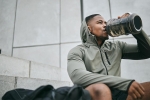Proper Hydration is Crucial During Sports Tournaments

Proper hydration is crucial for maintaining optimal performance during tournaments. Here are some guidelines to help you stay well-hydrated:
Pre-Tournament Hydration
-
Start Hydrating Early
- Begin hydrating at least 24 hours before the tournament. Drink plenty of water throughout the day leading up to the event.
-
Monitor Urine Color
- Aim for pale yellow urine, which indicates proper hydration. Dark yellow or amber-colored urine suggests dehydration.
-
Balanced Meals
- Eat meals with a good balance of carbohydrates, proteins, and fats, and include foods with high water content such as fruits and vegetables.
During the Tournament
-
Regular Fluid Intake
- Drink small amounts of water frequently rather than consuming large amounts infrequently. Aim for about 7-10 ounces (200-300 ml) every 10-20 minutes during the activity.
-
Electrolyte Replacement
- For events lasting longer than 60 minutes, consider drinking sports drinks that contain electrolytes like sodium, potassium, and magnesium. This helps replace the electrolytes lost through sweat.
-
Avoid Overhydration
- Drinking excessive amounts of water can lead to hyponatremia (low sodium levels in the blood). Balance water intake with electrolyte consumption.
-
Use a Schedule
- Create a hydration schedule and stick to it. Set reminders or use a timer to ensure you’re drinking at regular intervals.
Post-Tournament Hydration
-
Rehydrate
- Drink water or a sports drink within 30 minutes after finishing the tournament. Continue to hydrate over the next 24 hours to replenish fluids lost.
-
Eat Hydrating Foods
- Consume fruits and vegetables with high water content, such as watermelon, oranges, cucumbers, and strawberries.
-
Monitor Recovery
- Continue to monitor urine color and volume. If you experience symptoms of dehydration such as dizziness, dry mouth, or extreme thirst, increase your fluid intake.
General Tips
-
Personal Hydration Plan
- Develop a personal hydration plan based on your sweat rate, which can be determined by weighing yourself before and after a practice session to see how much fluid you lose.
-
Carry a Water Bottle
- Always have a water bottle with you and sip regularly.
-
Avoid Caffeinated and Alcoholic Beverages
- These can contribute to dehydration. Stick to water and electrolyte-rich drinks.
-
Environmental Factors
- Adjust your hydration strategy based on the weather. Hot and humid conditions require more fluid intake.
-
Listen to Your Body
- Pay attention to signs of dehydration such as thirst, dry mouth, headache, fatigue, and muscle cramps. Drink fluids promptly when you notice these signs.
By following these strategies, you can maintain optimal hydration, which will help you perform at your best and recover more quickly after tournaments.







